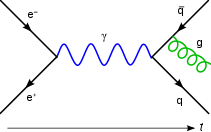Freeman Dyson | |
|---|---|
 Dyson at the Long Now Seminar in San Francisco, California, in 2005 | |
| Born | Freeman John Dyson 15 December 1923 Crowthorne, Berkshire, England |
| Died | 28 February 2020 (aged 96) |
| Nationality | British-American |
| Alma mater | |
| Known for | |
| Spouses |
|
| Children | 6, including Esther Dyson and George Dyson[1] |
| Awards |
|
| Scientific career | |
| Fields | Physics, mathematics |
| Institutions | |
| Academic advisors | Hans Bethe |
| Website | ias |
| Notes | |
He was the son of George Dyson. | |
| Quantum field theory |
|---|
 |
| History |
| Modern physics |
|---|
| |
Freeman John Dyson FRS (15 December 1923 – 28 February 2020)[1] was a British-American theoretical physicist and mathematician known for his works in quantum field theory, astrophysics, random matrices, mathematical formulation of quantum mechanics, condensed matter physics, nuclear physics, and engineering.[a][3] He was professor emeritus in the Institute for Advanced Study in Princeton and a member of the board of sponsors of the Bulletin of the Atomic Scientists.[4]
Dyson originated several concepts that bear his name, such as Dyson's transform, a fundamental technique in additive number theory,[5] which he developed as part of his proof of Mann's theorem;[6] the Dyson tree, a hypothetical genetically engineered plant capable of growing in a comet; the Dyson series, a perturbative series where each term is represented by Feynman diagrams; the Dyson sphere, a thought experiment that attempts to explain how a space-faring civilization would meet its energy requirements with a hypothetical megastructure that completely encompasses a star and captures a large percentage of its power output; and Dyson's eternal intelligence, a means by which an immortal society of intelligent beings in an open universe could escape the prospect of the heat death of the universe by extending subjective time to infinity while expending only a finite amount of energy.
Dyson disagreed with the scientific consensus on climate change. He believed that some of the effects of increased CO2 levels are favourable and not taken into account by climate scientists, such as increased agricultural yield, and further that the positive benefits of CO2 likely outweigh the negative effects.[7][8][9] He was sceptical about the simulation models used to predict climate change, arguing that political efforts to reduce causes of climate change distract from other global problems that should take priority.
- ^ a b George Dyson (June 2022). "Freeman John Dyson. 15 December 1923—28 February 2020". Biographical Memoirs of Fellows of the Royal Society. 73: 197–226. doi:10.1098/RSBM.2021.0050. ISSN 0080-4606. Wikidata Q115731803.
- ^ Cite error: The named reference
spouseobitwas invoked but never defined (see the help page). - ^ Cite error: The named reference
britwas invoked but never defined (see the help page). - ^ Cite error: The named reference
thebulletin.orgwas invoked but never defined (see the help page). - ^ Nathanson 1996, p. 42.
- ^ Halberstam & Roth 1983.
- ^ Dawidoff 2009.
- ^ Cite error: The named reference
CTM27was invoked but never defined (see the help page). - ^ Connor 2011.
Cite error: There are <ref group=lower-alpha> tags or {{efn}} templates on this page, but the references will not show without a {{reflist|group=lower-alpha}} template or {{notelist}} template (see the help page).

